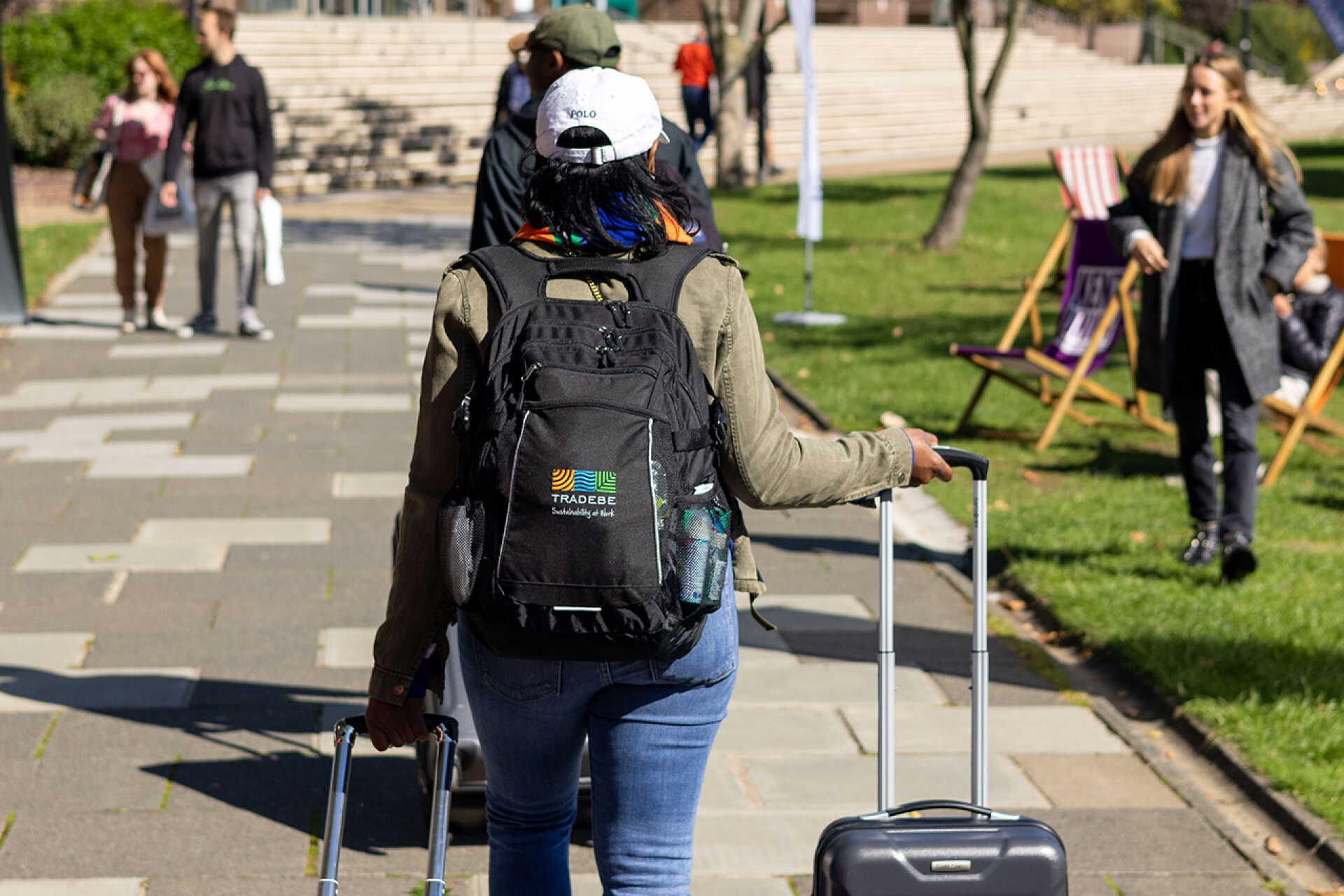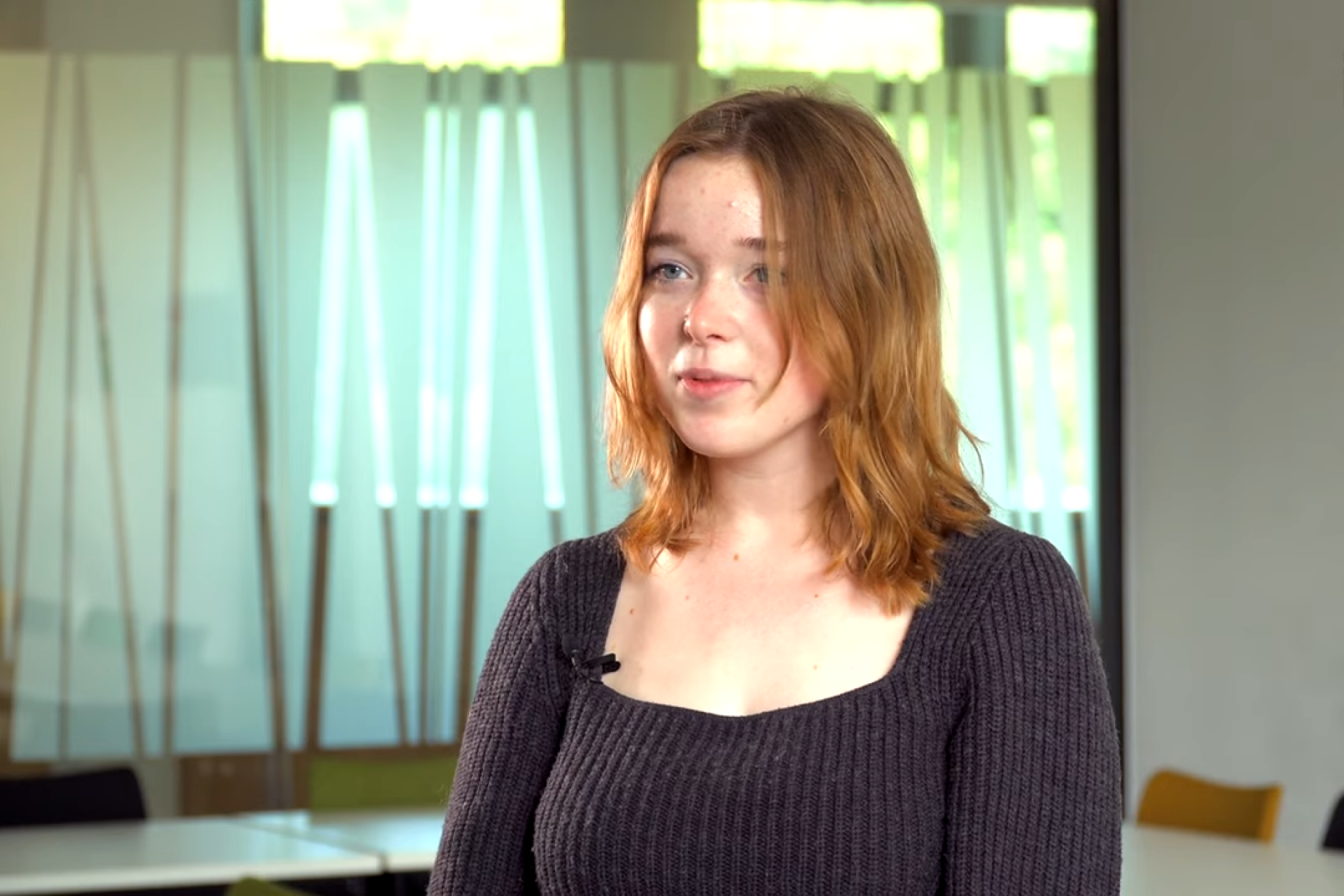Modern Languages
Develop language skills and forge connections between cultures to launch your career in a globalised world.

Develop language skills and forge connections between cultures to launch your career in a globalised world.
Our Modern Languages BA is unlike any other course of this kind in the UK. Our innovative degree hones your communication and intercultural competences whilst equipping you with a range of skills across areas such as digital, teaching and communication, ensuring you are career-ready from day one.
Kent offers unparalleled flexibility and personalised language learning paths tailored to your individual learning style, your strengths, and aspirations. This approach means whether you have studied a language for their GCSEs or A-levels, or if you are studying languages from scratch at Kent – you can expand your skills and achieve fluency. In your first year, you can refine existing language skills or explore one or several new languages in the friendly and informal environment of our Language Lab. With options including Arabic, French, German, Italian, Japanese, Mandarin, and Spanish, you will begin at a level suited to you, making rapid progress and setting your own pace in your studies.
You graduate with more than linguistic proficiency. You'll leave with a comprehensive cultural, social, and political understanding of the areas where your chosen languages are spoken, and of the relations among them. You’ll become an expert of the globalised world and be equipped with the knowledge to navigate and address crucial societal issues. You will be prepared to thrive in diverse career paths across the globe, from international business to diplomacy, education, and beyond.

Modern Languages unlocks opportunities across the globe. From classroom to boardroom, you'll be ready to craft a career tailored to your interests.
Over 89% of final-year Languages and Linguistics students were satisfied with the quality of teaching on their course in The Guardian University Guide 2025.

Our optional Year Abroad give you the intercultural awareness and real-world experience that are highly sought after by employers.
You can pick from languages across the globe, allowing you to expand your career options and broaden your horizons.

Alice and Georgie share their experiences of studying Modern Languages at Kent.
Our typical offer levels are listed below and include indicative contextual offers. If you hold alternative qualifications just get in touch and we'll be glad to discuss these with you.
BBB
The University will consider applicants holding BTEC National Diploma and Extended National Diploma Qualifications (QCF; NQF; OCR) on a case-by-case basis. Please contact us for further advice on your individual circumstances. A typical offer would be to achieve DMM.
120 tariff points - typically H5 H6 H6 or equivalent
Applicants wishing to study two languages should have grade B or equivalent at GCSE, ideally in one of your target languages. This is not required of applicants wishing to study one language only.
Pass the University of Kent International Foundation Programme.
The University will consider applicants holding T level qualifications in subjects closely aligned to the course.
Obtain Access to Higher Education Diploma with 45 credits at Level 3 with 24 credits at Distinction and 21 credits at Merit.
When applying you will need to indicate, under 'further details' in the 'choices' section of your application, the language or languages that you wish to study using the codes below. For further information on completing your UCAS form, please visit the UCAS website.
It may be possible to study further languages to a lower level of proficiency than degree level in our Language Centre, subject to demand. This is arranged once you register as a student.
You could choose to add a Year in a Language to your degree to create a four-year programme with a third language option.
The following modules are what students typically study, but this may change year to year in response to new developments and innovations.
Gain the essential analytical tools and methodologies to critically assess cultural artifacts, texts, and practices. Through lectures, seminars, in-class discussions and independent study, you'll develop a sophisticated comprehension of cultural phenomena across the globe, with a particular focus on cultural expressions in French, German, Italian, and Spanish language. By engaging with examples from literature, music, film, and television, but also from advertising, politics and everyday culture, you'll explore and apply methodologies from philosophy, linguistics, literary, media, and gender studies and other relevant fields. This will provide you with a solid foundation to develop a nuanced understanding of the complexities of cultural dynamics in today’s interconnected world.
Explore the political and cultural history of several countries – and of increasingly globalising contexts – through the prism of a number of frequently related social, cultural and political processes: resistance, revolution, contestation. From political revolutions, industrial revolutions and cultural revolutions to digital revolutions, critical analysis of each case study in the module interrogates the (often violent) formation of states, the origins of modernity, and the understandings and limits of freedom and power.
At the same time, you'll survey political resistance to and cultural contestation of the prevailing political and economic order in both pre-revolutionary and post-revolutionary contexts. By tracing the histories of revolution, resistance and cultural contestation in several settings, you'll gain a solid understanding of their local and transnational impact and legacy in the modern era heralded by the French Revolution of 1789.
Explore the historical geopolitical, economic and cultural relations between nations which shape the contemporary context of globalised business. We focus on the political, economic, and cultural exchanges that have shaped the contemporary world through a specific lens: the production, circulation, and consumption of commodities.
How have booms in specific commodities – such as sugar, oil, or drugs – at different points during the last five centuries determined contemporary inequalities, hierarchies, and stereotypes? How have national cultures and languages, and relations between nations, been significantly determined by the circulation of these goods? How have individuals, whose labour often represents the commodity itself (for example in sex work, care work, and the reproductive bioeconomy), navigated these global flows, becoming part of those flows or resisting them?
Through engagement with key theories from modern languages and cultural studies, you'll gain a critical understanding of how nations, businesses and individuals communicate across geographic, linguistic, cultural and digital divides. By analysing case studies including films, novels, and music, from contexts across the globe, you'll develop the intercultural awareness needed in global markets and the skills required to communicate effectively in multicultural business environments.
Develop the fundamental skills for your future studies in languages, intercultural communication and beyond. Through lectures, hands-on language labs, and dynamic seminars, you'll build a solid foundation in language acquisition, cross-cultural understanding, and linguistic analysis. Explore how language shapes identities, perceptions, and social interactions, preparing them for intercultural communication challenges. Equipped with these foundational insights and analytical tools, you are primed to pursue further studies in languages, intercultural communication, and related fields, armed with an understanding of the complexities of human communication. This module additionally gives you the opportunity to engage in discussions regarding their intended language(s) of specialisation for their subsequent stages of study.
The Languages Lab Project 1 is the inaugural module in a series designed to empower you with the tools and skills to delve into the intricacies of any language of your choosing. Serving as the foundation for the Languages Lab project 2 module, and for subsequent modules in the series in stages 2 and 3, this module gives you the opportunity to embark on a language project tailored to your interests and aspirations.
Through hands-on activities, collaborative projects, and guided exploration, you'll start developing an appreciation for the complexities of language acquisition and cross-cultural communication. You'll gain foundational language skills (or improve existing language skills) in your chosen language(s), equipping you for future studies in stages 2 and 3. We provide the autonomy for you to develop your language skills independently and prepare for further academic exploration in subsequent stages.
By participating in Language Lab tutorials, you'll gain valuable insights and guidance to make informed decisions regarding their language selection for stages 2 and 3.
Building upon the foundational knowledge and skills acquired in Language Lab Project 1, the second iteration of our language exploration series sets the stage for academic language learning in stages 2 and 3.
In this module students delve into the intricacies of their chosen language(s), building an appreciation for the nuances of language acquisition and cross-cultural communication.
Language Lab Project 2 offers you the opportunity to build or expand their foundational language skills, or to embark on the journey of learning new languages altogether. With a focus on autonomy and self-directed learning, this module empowers you to take charge of your language development, preparing you for the academic challenges awaiting in subsequent stages.
Throughout Language Lab tutorials, you'll receive invaluable insights and personalised guidance to aid in their decision-making process for selecting languages to pursue in stages 2 and 3. By harnessing the expertise of our instructors, you'll emerge from Language Lab Project 2 equipped with the confidence necessary for successfully navigating your studies in the years to come.
You'll choose 60 credits from a list of language modules. If you do not have prior knowledge of a foreign language, these will be modules in a language of your choice starting from beginners’ level in Autumn Term. If you do have some prior knowledge in a foreign language, you choose 20 credits from a list of modules in Linguistics, Comparative Literature and other relevant subject areas in Autumn Term. For the remaining 40 credits, you can choose either intermediate (level 5) and advanced (level 6) language modules in Spring and Summer Term or the Modern Languages Cultural Project module in the Summer Term.
Get a unique perspective on the cultural history of modern societies alongside key developments in technology and media. This module draws on cutting-edge research in Modern Languages as well as on history, philosophy and media theory. Topics span from the 1400s to the present day and may include: 1) How the invention of the printing press enabled the Protestant Reformation; 2) The relationship between literature and letter-writing; 3) The rise of the press and the emergence of nationalism in the nineteenth-century; 4) The impact of the press in Latin America on the abolition of slavery; 5) Social Media’s impact on popular movements such as the Arab Spring.
You'll engage with a range of historical documents, literary texts, audio as well as visual media, and analyse their impact on culture and politics in a range of national, regional and global settings. You will also have the opportunity to present your work in both traditional and innovative forms of assessment (screencast presentations, blogs and essays). Besides a deep analytical engagement with the culturally transformative effects of technology and media, you'll gain practical skills in the expression and presentation of their ideas, using a variety of conventional as well as digital means.
What is the environment? What is ecology? What is sustainability? What are the origins of these terms, and how have the meanings evolved over time and across cultures? While the concepts have their roots in the natural sciences, it is becoming evident that related theories and practices are of relevance in social and cultural studies as much as biophysical relationships.
The module begins with an examination of the wide-ranging definitions of the environment, ecology and sustainability and of the contribution to the discourse from Arts and Humanities subjects. We proceed to analyse a range of case studies highlighting cultural practices ranging across time periods and geographies in which sustainable processes are key. The module concludes with a consideration of how the case studies illustrate theories and practices of sustainability, and how in turn they may be considered catalysts for further engagement in questions of sustainability.
This module provides students with a general introduction to the analysis of a variety of cultural forms from different national contexts, paying particular attention to the specificities of different media within the visual arts (e.g. paintings, photographs, classical and popular music), screen media (e.g. fiction films, documentaries, TV series) and literature (e.g., poems, short stories, novels). Lectures will introduce key theoretical and critical frameworks and seminars will consist of their application to specific texts from a variety of cultural contexts. The module also introduces you to some of the principal artistic movements at particular historical moments in the 19th and 20th centuries such as: impressionism, realism, surrealism, modernism and postmodernism. These will be examined across a variety of media, such as the visual arts, literature and screen media, and again in a variety of cultural and national contexts.
At the start of your degree, you will delve into the basics of French language learning, immersing yourself in the culture of French-speaking countries. You’ll focus on honing listening, speaking, reading, and writing skills, all geared towards practical communication in everyday situations, such as greetings, introductions, and personal interactions.
Additionally, you will be equipped with basic intercultural communication skills essential for navigating the cultural nuances of regions where French is spoken.
In this module, you will focus on developing communicative competence, immersing themselves in the culture of French-speaking countries. The curriculum will therefore prioritise the development of listening, speaking, reading, and writing skills, all aimed at achieving a practical understanding of French and fostering strong intercultural communicative competence and confidence.
Moreover, you’ll have the opportunity to engage in discussions on topics relevant to everyday life, honing everyday conversational skills, including on aspects of university life and the experience of being a student.
In this module, you will undertake an advanced exploration of intercultural communicative competence, delving deeply into the cultural nuances of French-speaking countries through exploration of, e.g. current political and social issues.
The curriculum will hone listening, speaking, reading, and writing skills, culminating in a command of French and a level of communicative prowess appropriate for the upper intermediate to advanced level.
At the start of your degree, you will delve into the basics of German language learning, immersing yourself in the culture of German-speaking countries. The curriculum will focus on honing listening, speaking, reading, and writing skills, all geared towards practical communication in everyday situations, such as greetings, introductions, and personal interactions.
Additionally, you will be equipped with basic intercultural communication skills essential for navigating the cultural nuances of regions where German is spoken.
In this module, you will focus on developing communicative competence, immersing themselves in the culture of German-speaking countries. The curriculum will therefore prioritise the development of listening, speaking, reading, and writing skills, all aimed at achieving a practical understanding of German and fostering strong intercultural communicative competence and confidence.
Moreover, you’ll have the opportunity to engage in discussions on topics relevant to everyday life, honing everyday conversational skills, including on aspects of university life and the experience of being a student.
In this module, you will undertake an advanced exploration of intercultural communicative competence, delving deeply into the cultural nuances of German-speaking countries through exploration of, e.g. current political and social issues.
The curriculum will hone listening, speaking, reading, and writing skills, culminating in a command of German and a level of communicative prowess appropriate for the upper intermediate to advanced level.
At the start of your degree, you will delve into the basics of Spanish language learning, immersing yourself in the culture of Spanish-speaking countries. The curriculum will focus on honing listening, speaking, reading, and writing skills, all geared towards practical communication in everyday situations, such as greetings, introductions, and personal interactions.
Additionally, you will be equipped with basic intercultural communication skills essential for navigating the cultural nuances of regions where Spanish is spoken.
In this module, you will focus on developing communicative competence, immersing themselves in the culture of Spanish-speaking countries. The curriculum will therefore prioritise the development of listening, speaking, reading, and writing skills, all aimed at achieving a practical understanding of Spanish and fostering strong intercultural communicative competence and confidence.
Moreover, you’ll have the opportunity to engage in discussions on topics relevant to everyday life, honing everyday conversational skills, including on aspects of university life and the experience of being a student.
In this module, you will undertake an advanced exploration of intercultural communicative competence, delving deeply into the cultural nuances of Spanish-speaking countries through exploration of, e.g. current political and social issues.
The curriculum will hone listening, speaking, reading, and writing skills, culminating in a command of Spanish and a level of communicative prowess appropriate for the upper intermediate to advanced level.
At the start of your degree, you will delve into the basics of Italian language learning, immersing yourself in the culture of Italian-speaking countries. The curriculum will focus on honing listening, speaking, reading, and writing skills, all geared towards practical communication in everyday situations, such as greetings, introductions, and personal interactions.
Additionally, you will be equipped with basic intercultural communication skills essential for navigating the cultural nuances of regions where Italian is spoken.
In this module, you will focus on developing communicative competence, immersing themselves in the culture of Italian-speaking countries. The curriculum will therefore prioritise the development of listening, speaking, reading, and writing skills, all aimed at achieving a practical understanding of Italian and fostering strong intercultural communicative competence and confidence.
Moreover, you’ll have the opportunity to engage in discussions on topics relevant to everyday life, honing everyday conversational skills, including on aspects of university life and the experience of being a student.
In this module, you will undertake an advanced exploration of intercultural communicative competence, delving deeply into the cultural nuances of Italian-speaking countries through exploration of, e.g. current political and social issues.
The curriculum will hone listening, speaking, reading, and writing skills, culminating in a command of Italian and a level of communicative prowess appropriate for the upper intermediate to advanced level.
At the start of your degree, you will delve into the basics of Mandarin language learning, immersing yourself in the culture of Mandarin-speaking countries. The curriculum will focus on honing listening, speaking, reading, and writing skills, all geared towards practical communication in everyday situations, such as greetings, introductions, and personal interactions.
Additionally, you will be equipped with basic intercultural communication skills essential for navigating the cultural nuances of regions where Mandarin is spoken.
In this module, you will focus on developing communicative competence, immersing themselves in the culture of Mandarin-speaking countries. The curriculum will therefore prioritise the development of listening, speaking, reading, and writing skills, all aimed at achieving a practical understanding of Mandarin and fostering strong intercultural communicative competence and confidence.
Moreover, you’ll have the opportunity to engage in discussions on topics relevant to everyday life, honing everyday conversational skills, including on aspects of university life and the experience of being a student.
In this module, you will undertake an advanced exploration of intercultural communicative competence, delving deeply into the cultural nuances of Mandarin-speaking countries through exploration of, e.g. current political and social issues.
The curriculum will hone listening, speaking, reading, and writing skills, culminating in a command of Mandarin and a level of communicative prowess appropriate for the upper intermediate to advanced level.
At the start of your degree, you will delve into the basics of Japanese language learning, immersing yourself in the culture of Japanese-speaking countries. The curriculum will focus on honing listening, speaking, reading, and writing skills, all geared towards practical communication in everyday situations, such as greetings, introductions, and personal interactions.
Additionally, you will be equipped with basic intercultural communication skills essential for navigating the cultural nuances of regions where Japanese is spoken.
In this module, you will focus on developing communicative competence, immersing themselves in the culture of Japanese-speaking countries. The curriculum will therefore prioritise the development of listening, speaking, reading, and writing skills, all aimed at achieving a practical understanding of Japanese and fostering strong intercultural communicative competence and confidence.
Moreover, you’ll have the opportunity to engage in discussions on topics relevant to everyday life, honing everyday conversational skills, including on aspects of university life and the experience of being a student.
In this module, you will undertake an advanced exploration of intercultural communicative competence, delving deeply into the cultural nuances of Japanese-speaking countries through exploration of, e.g. current political and social issues.
The curriculum will hone listening, speaking, reading, and writing skills, culminating in a command of Japanese and a level of communicative prowess appropriate for the upper intermediate to advanced level.
At the start of your degree, you will delve into the basics of Arabic language learning, immersing yourself in the culture of Arabic-speaking countries. The curriculum will focus on honing listening, speaking, reading, and writing skills, all geared towards practical communication in everyday situations, such as greetings, introductions, and personal interactions.
Additionally, you will be equipped with basic intercultural communication skills essential for navigating the cultural nuances of regions where Arabic is spoken.
In this module, you will focus on developing communicative competence, immersing themselves in the culture of Arabic-speaking countries. The curriculum will therefore prioritise the development of listening, speaking, reading, and writing skills, all aimed at achieving a practical understanding of Arabic and fostering strong intercultural communicative competence and confidence.
Moreover, you’ll have the opportunity to engage in discussions on topics relevant to everyday life, honing everyday conversational skills, including on aspects of university life and the experience of being a student.
In this module, you will undertake an advanced exploration of intercultural communicative competence, delving deeply into the cultural nuances of Arabic-speaking countries through exploration of, e.g. current political and social issues.
The curriculum will hone listening, speaking, reading, and writing skills, culminating in a command of Arabic and a level of communicative prowess appropriate for the upper intermediate to advanced level.
This is your chance to formulate and deliver a research project of your own making, whether it be a dissertation, a portfolio of texts, a publication, a podcast, a documentary, a short film, a performance, an app, or another form of public interaction derived from research and knowledge of modern foreign languages and cultures and advanced intercultural competence.
Supported by appropriate instruction, you'll develop independent research skills and creative practices as you engage with material of personal and/or professional interest. Benefit from the opportunity to devote a sustained period of time to an area for which you feel enthusiasm, curiosity, and passion, and independently immerse yourself in the modern foreign language(s) you're studying.
At the start of your degree, you will delve into the basics of French language learning, immersing yourself in the culture of French-speaking countries. You’ll focus on honing listening, speaking, reading, and writing skills, all geared towards practical communication in everyday situations, such as greetings, introductions, and personal interactions.
Additionally, you will be equipped with basic intercultural communication skills essential for navigating the cultural nuances of regions where French is spoken.
In this module, you will focus on developing communicative competence, immersing themselves in the culture of French-speaking countries. The curriculum will therefore prioritise the development of listening, speaking, reading, and writing skills, all aimed at achieving a practical understanding of French and fostering strong intercultural communicative competence and confidence.
Moreover, you’ll have the opportunity to engage in discussions on topics relevant to everyday life, honing everyday conversational skills, including on aspects of university life and the experience of being a student.
In this module, you will undertake an advanced exploration of intercultural communicative competence, delving deeply into the cultural nuances of French-speaking countries through exploration of, e.g. current political and social issues.
The curriculum will hone listening, speaking, reading, and writing skills, culminating in a command of French and a level of communicative prowess appropriate for the upper intermediate to advanced level.
At the start of your degree, you will delve into the basics of German language learning, immersing yourself in the culture of German-speaking countries. The curriculum will focus on honing listening, speaking, reading, and writing skills, all geared towards practical communication in everyday situations, such as greetings, introductions, and personal interactions.
Additionally, you will be equipped with basic intercultural communication skills essential for navigating the cultural nuances of regions where German is spoken.
In this module, you will focus on developing communicative competence, immersing themselves in the culture of German-speaking countries. The curriculum will therefore prioritise the development of listening, speaking, reading, and writing skills, all aimed at achieving a practical understanding of German and fostering strong intercultural communicative competence and confidence.
Moreover, you’ll have the opportunity to engage in discussions on topics relevant to everyday life, honing everyday conversational skills, including on aspects of university life and the experience of being a student.
In this module, you will undertake an advanced exploration of intercultural communicative competence, delving deeply into the cultural nuances of German-speaking countries through exploration of, e.g. current political and social issues.
The curriculum will hone listening, speaking, reading, and writing skills, culminating in a command of German and a level of communicative prowess appropriate for the upper intermediate to advanced level.
At the start of your degree, you will delve into the basics of Spanish language learning, immersing yourself in the culture of Spanish-speaking countries. The curriculum will focus on honing listening, speaking, reading, and writing skills, all geared towards practical communication in everyday situations, such as greetings, introductions, and personal interactions.
Additionally, you will be equipped with basic intercultural communication skills essential for navigating the cultural nuances of regions where Spanish is spoken.
In this module, you will focus on developing communicative competence, immersing themselves in the culture of Spanish-speaking countries. The curriculum will therefore prioritise the development of listening, speaking, reading, and writing skills, all aimed at achieving a practical understanding of Spanish and fostering strong intercultural communicative competence and confidence.
Moreover, you’ll have the opportunity to engage in discussions on topics relevant to everyday life, honing everyday conversational skills, including on aspects of university life and the experience of being a student.
In this module, you will undertake an advanced exploration of intercultural communicative competence, delving deeply into the cultural nuances of Spanish-speaking countries through exploration of, e.g. current political and social issues.
The curriculum will hone listening, speaking, reading, and writing skills, culminating in a command of Spanish and a level of communicative prowess appropriate for the upper intermediate to advanced level.
At the start of your degree, you will delve into the basics of Italian language learning, immersing yourself in the culture of Italian-speaking countries. The curriculum will focus on honing listening, speaking, reading, and writing skills, all geared towards practical communication in everyday situations, such as greetings, introductions, and personal interactions.
Additionally, you will be equipped with basic intercultural communication skills essential for navigating the cultural nuances of regions where Italian is spoken.
In this module, you will focus on developing communicative competence, immersing themselves in the culture of Italian-speaking countries. The curriculum will therefore prioritise the development of listening, speaking, reading, and writing skills, all aimed at achieving a practical understanding of Italian and fostering strong intercultural communicative competence and confidence.
Moreover, you’ll have the opportunity to engage in discussions on topics relevant to everyday life, honing everyday conversational skills, including on aspects of university life and the experience of being a student.
In this module, you will undertake an advanced exploration of intercultural communicative competence, delving deeply into the cultural nuances of Italian-speaking countries through exploration of, e.g. current political and social issues.
The curriculum will hone listening, speaking, reading, and writing skills, culminating in a command of Italian and a level of communicative prowess appropriate for the upper intermediate to advanced level.
At the start of your degree, you will delve into the basics of Mandarin language learning, immersing yourself in the culture of Mandarin-speaking countries. The curriculum will focus on honing listening, speaking, reading, and writing skills, all geared towards practical communication in everyday situations, such as greetings, introductions, and personal interactions.
Additionally, you will be equipped with basic intercultural communication skills essential for navigating the cultural nuances of regions where Mandarin is spoken.
In this module, you will focus on developing communicative competence, immersing themselves in the culture of Mandarin-speaking countries. The curriculum will therefore prioritise the development of listening, speaking, reading, and writing skills, all aimed at achieving a practical understanding of Mandarin and fostering strong intercultural communicative competence and confidence.
Moreover, you’ll have the opportunity to engage in discussions on topics relevant to everyday life, honing everyday conversational skills, including on aspects of university life and the experience of being a student.
In this module, you will undertake an advanced exploration of intercultural communicative competence, delving deeply into the cultural nuances of Mandarin-speaking countries through exploration of, e.g. current political and social issues.
The curriculum will hone listening, speaking, reading, and writing skills, culminating in a command of Mandarin and a level of communicative prowess appropriate for the upper intermediate to advanced level.
At the start of your degree, you will delve into the basics of Japanese language learning, immersing yourself in the culture of Japanese-speaking countries. The curriculum will focus on honing listening, speaking, reading, and writing skills, all geared towards practical communication in everyday situations, such as greetings, introductions, and personal interactions.
Additionally, you will be equipped with basic intercultural communication skills essential for navigating the cultural nuances of regions where Japanese is spoken.
In this module, you will focus on developing communicative competence, immersing themselves in the culture of Japanese-speaking countries. The curriculum will therefore prioritise the development of listening, speaking, reading, and writing skills, all aimed at achieving a practical understanding of Japanese and fostering strong intercultural communicative competence and confidence.
Moreover, you’ll have the opportunity to engage in discussions on topics relevant to everyday life, honing everyday conversational skills, including on aspects of university life and the experience of being a student.
In this module, you will undertake an advanced exploration of intercultural communicative competence, delving deeply into the cultural nuances of Japanese-speaking countries through exploration of, e.g. current political and social issues.
The curriculum will hone listening, speaking, reading, and writing skills, culminating in a command of Japanese and a level of communicative prowess appropriate for the upper intermediate to advanced level.
At the start of your degree, you will delve into the basics of Arabic language learning, immersing yourself in the culture of Arabic-speaking countries. The curriculum will focus on honing listening, speaking, reading, and writing skills, all geared towards practical communication in everyday situations, such as greetings, introductions, and personal interactions.
Additionally, you will be equipped with basic intercultural communication skills essential for navigating the cultural nuances of regions where Arabic is spoken.
In this module, you will focus on developing communicative competence, immersing themselves in the culture of Arabic-speaking countries. The curriculum will therefore prioritise the development of listening, speaking, reading, and writing skills, all aimed at achieving a practical understanding of Arabic and fostering strong intercultural communicative competence and confidence.
Moreover, you’ll have the opportunity to engage in discussions on topics relevant to everyday life, honing everyday conversational skills, including on aspects of university life and the experience of being a student.
In this module, you will undertake an advanced exploration of intercultural communicative competence, delving deeply into the cultural nuances of Arabic-speaking countries through exploration of, e.g. current political and social issues.
The curriculum will hone listening, speaking, reading, and writing skills, culminating in a command of Arabic and a level of communicative prowess appropriate for the upper intermediate to advanced level.
Compulsory language modules typically involve three to four hours of classes per week, including one hour of small group work with a native speaker. We also make extensive use of computer-assisted language learning packages and audio and video materials.
Culture and literature modules typically involve a weekly two-hour seminar plus essay supervision. We employ language lectors, who are all native speakers, to help students improve their fluency and make rapid progress.
At all stages, assessment is based 100% on coursework (essays, oral presentations) in the first half of the year, and a combination of coursework and examination in the second half of the year. Credits from your year abroad count towards your final degree.
For a student studying full time, each academic year of the programme will comprise 1200 learning hours which include both direct contact hours and private study hours. The precise breakdown of hours will be subject dependent and will vary according to modules.
Methods of assessment will vary according to subject specialism and individual modules.
Please refer to the individual module details under Course Structure.
For programme aims and learning outcomes please see the programme specification.
I really enjoy the oral seminars too – I have a native French teacher, who is really enthusiastic, really fun.

The ability to speak more than one language is a key asset in the global employment market, and one that employers seek out. This means you can flexibly work across many fields and industries, and of course, across different countries.
Beyond your language skills, you will graduate equipped with skills such as, communication, mediation, analysis and leadership. These give you confidence to offer creative solutions when faced with challenges, and the ability to express your ideas with clarity and passion. These are skills that make employers take notice, and you will be able to make change happen in the places you want to see it.
Our graduates are proof of this, going into fields as varied as: international banking, diplomacy, publishing, journalism, interpreting and translating, media, marketing and language teaching. Wherever your passions and future lie, through studying Modern Languages at Kent, you will have the tools needed to get there.

As time’s gone on, I’ve got more confident about going on air and now I’d like to present my own show.

The University will assess your fee status as part of the application process. If you are uncertain about your fee status you may wish to seek advice from UKCISA before applying.
For details of when and how to pay fees and charges, please see our Student Finance Guide.
IT Equipment
Students will require regular access to a desktop computer/laptop with an internet connection to use the University of Kent’s online resources and systems. Please see information about the minimum computer requirements for study.
Find out more about accommodation and living costs, plus general additional costs that you may pay when studying at Kent.
Kent offers generous financial support schemes to assist eligible undergraduate students during their studies. See our funding page for more details.

We have a range of subject-specific awards and scholarships for academic, sporting and musical achievement.
We welcome applications from students all around the world with a wide range of international qualifications.

Student Life

Powered by progress
Kent has climbed 12 places to reach the top 40 in The Times Good University Guide 2025.
Kent Sport
Kent has risen 11 places in THE’s REF 2021 ranking, confirming us as a leading research university.

An unmissable part of your student experience.